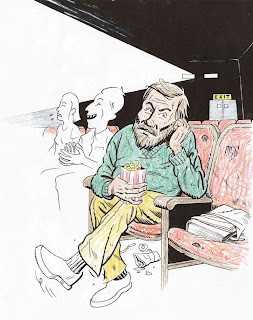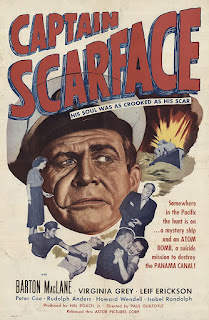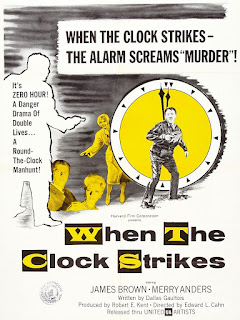Captain Scarface (1953)
A ship is about to set sail from South America, and as the captain chats on deck with his nervous first mate, it's obvious that they're scoundrels more than sailors. You're thinking the movie will be about smuggling, or a faked passport, or possibly a slight case of murder. Nah, this movie has moxie — they're up to something bigger than that.Loose lips sink ships and slip spoilers, so I'll say no more about the story, except that it all seems highly unlikely, but it's an enjoyable hour and a half sailing on the black-and-white ocean blue.
"You appreciate too many women. You would be much better off to appreciate just one woman. Maybe then you would not always be in trouble."
Verdict: YES.
♦ ♦ ♦
Fear and Desire (1953)
This was Stanley Kubrick's first feature film, and he thought it stank so much that when he became rich and famous, he tried to buy and destroy every existing print. Only three copies are known to remain in existence.Should we respect Kubrick on Kubrick and let the movie rot, or should we watch this restoration? I watched it, of course.
It's less than an hour, padded with a five-minute Kubrick interview from the 1960s, wherein he describes Fear and Desire as "a terrible, dull, undramatic, but very, very serious allegorical story about four soldiers from an unnamed country behind enemy lines, trying to find their way home again."
Sometimes an artist is his own worst judge of the art, and Kubrick is wrong. The movie's not terrible, maybe not thrilling but never dull, and it's plenty dramatic.
The title is generic and forgettable, and the movie doesn't look like a war; it looks like it was filmed on location in a pleasant city park on a sunny day. Some of the voiceover, supposedly the thoughts of the soldiers, is laughable, and occasionally the dialogue tries so hard to be profound that instead it's pretentious.
Call it a rough draft for a Kubrick movie. It's the worst of his films, but that's hardly a criticism. It's better than the best by a lot of others.
It was written by Howard Sackler, who later wrote the quite good Saint Jack and the quite bad Jaws 2.
It co-stars Paul Mazursky, who made some beloved movies in the 1970s and '80s, including Next Stop, Greenwich Village and Down and Out in Beverly Hills.
And it was photographed, edited, produced, directed, and lunch prepared by Stanley Kubrick, who went on to become Stanley Kubrick.
Verdict: YES.
♦ ♦ ♦
Punishment Park (1971)
Punishment Park consists of desert sands and rugged hills, across which the convicts must, within three days and two nights, reach an American flag they've been told is 53 miles away. While they make this dangerous run in 100°+ heat, they're pursued by the National Guard, federal marshals, and members of the city police riot squad.
That might sound like The Running Man or Escape from New York, but it's not. Those are movies designed to sell tickets and popcorn; Punishment Park is a political statement, and I mostly agree with its perspective, so I thought it was terrific.
It's presented as a documentary, with courtroom proceedings and a litany of familiar complaints — no-knock raids, stop-and-frisk laws, cancellation of Fifth Amendment immunity, preventative detention, the activation of detention camps, and the establishment of quasi-judicial tribunals.
The movie is fifty years old, but how many of those Constitutional violations you're aware of depends only on how closely you follow the news.
As the race for the flag unfolds, the 'documentary-makers' let left and right speak their minds, and what they're saying sounds so passionate and blunt, I wondered whether these were actors performing a script, or people voicing their own political beliefs. It seems to have been the latter, as the credits don't include any "written by."
Punishment Park is powerful, but of course, not perfect, and I could nitpick about a few minor things. I won't, though. It's a low-budget masterpiece. Screw the nitpicking and watch the movie.
"The administration has chosen to accept and exploit the present division within the country and to side with what it considers is the majority. Instead of the politics or reconciliation, it has chosen the politics of polarization."
Verdict: BIG YES.
♦ ♦ ♦
Twister (1989)
 |
| The Neverending Film Festival #44 |
I'd always wanted to see the big hit movie about people chasing twisters, but oops, this ain't that. There is a twister in this Twister, but it's mostly about a family that's ripping itself apart without any help from the weather.
Based on a novel by Mary Robison, it features Suzy Amis as an impatient and troubled young mother, Crispin Glover as the fragile Uncle Howdy, Harry Dean Stanton as their wealthy but distant father, and Dylan McDermott as Amis's estranged husband. In everything he's in, McDermott is viscerally annoying and the biggest problem, but he's the most likable character here.
"I really admire you for burning down the tool shed."
The story is sometimes strange, sometimes simply boring, and really isn't much of a story, but midway along there's a minute-and-a-half cameo from William S Burroughs, which tempted me to take all the strangeness more seriously. One could, I suppose, search for a meaning amidst the strangeness, but nah, it's just a long visit with an American family that's weird, but not as weird as mine.
Verdict: MAYBE.
♦ ♦ ♦
Twister (1996)
OK, here's the Twister I'd half-wanted to see. Buncha kooks have the wacky hobby of chasing tornadoes. Well, not chasing 'em, they're trying to get ahead of them.Directed by Speed-guy Jan de Bont. Co-written by Michael Crichton. Starring some favorites of mine, including Helen Hunt, with Philip Seymour Hoffman before he was famous, and Jami Gertz after she was famous, and mid-level names in lots of the smaller roles.
It's from Amblin so it's all very Spielberg, a popcorn pedigree. It starts with a great goosebump-inducing opening scene, of a twister sucking a man right out of his storm cellar. A few of the effects look cheesy, 25 years later. I don't know squat about twisters and such, but I'm pretty sure the movie's 'science' is overblown (get it?).
That's not the point, though, and there's no brain power or moral to the story or anything. No critical analysis needed. You must be this tall to ride, and you are this tall.
Verdict: YES.
♦ ♦ ♦
The Walking Target (1960)
Nick Harbin (Robert Foster) robbed a company's payroll and hid the cash — $260,000. He was caught and convicted, sentenced to five years in prison. Now he's about to be released, but he's never told anyone where the money is hidden. The warden warns him as he leaves, that the cops will be watching him.
"As long as that money is missing, there'll be a spotlight right on you… You're no ordinary ex-con. You're a walking target."
Hmmm. Are you thinking what I'm thinking?
I'm thinking about right and wrong. Maybe the money belongs to the company, legally, or to the insurance company that paid the company's claim. Philosophically, though, seems to me it's Nick Harbin's dough. He earned it, didn't he? He stole it, sure, but then he served his prison time, "paid his debt to society," as they say.
The movie doesn't ponder such questions. It's a fairly standard potboiler about how Nick's friends all want a slice of the money, or all of it. As promised by the warden, the cops are tailing Nick, too, everywhere he goes. One of them says, "Don't quote your civil rights at me, Harbin," and keeps telling him he's a louse.
Two things about The Walking Target seem worth mentioning. First, it's better than the genre average, with a plot that makes sense, tightly directed and with some fine performances, especially in the smaller roles. Great ending, too.
More memorably, about half the cast have big ears, poking way out from the side of their heads. Just when you're getting used to the lead actor's huge sidehorns, along comes some character with even bigger ears, and after that, someone else who looks like an elephant that could fly.
Verdict: YES. You will believe an elephant can fly.
♦ ♦ ♦
Weird Woman (1944)
Based on the novel by Fritz Leiber Jr, this is an"Inner Sanctum" movie, and I gave it a shot because I'd liked another "Inner Sanctum" movie a while back. This one's kinda sucky, though, so I'm probably done with the series.
Lon Chaney plays an anthropologist or something, a know-it-all about "the weird pagan rituals of the islands." My guess is that it's the Hawaiian Islands, though that's never specified and the movie certainly wasn't filmed on location. Chaney the expert doesn't know enough, though, to not cross the line of death, despite being warned in advance and in English.
Half the story is about the power of Island superstitions, but the other half revolves around a series of women scheming to get his attention, and each half is as improbable as the other.
Chaney is in his late 30s here but looks 50, playing a professorial type, married to a woman way too young, and all the ladies find him irresistible. Lon Chaney Jr? I'm a fan. He was great at playing monsters, and I've also liked his performances as doddering old men once he got old and started doddering, but c'mon, even with the Clark Gable mustache he's sporting here, Chaney was always 'resistible'.
Verdict: NO.
— — —














